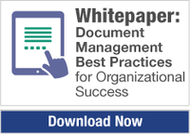
Remember: there are plenty of claims a vendor can make that are immediately logical and appealing. When you're looking to buy document management solutions, those claims are the red flags that should prompt you to ask more critical questions.
We’ve discussed SaaS vendors who offer the lowest prices and affix themselves with “best of breed” labels. Be equally skeptical and prepared when you see these terms thrown around:
Industry Analysts
I’m amazed at how many people pick a solution from a quadrant or list without asking the person or team that compiled the list, how many solutions have they actually implemented with the vendors on the list? Another question might be what criteria were used to determine the list?
Many lists are based on vendor sales volume. Does sales volume = a good solution? It could. But, it might just equal a great sales and marketing team. Sometimes the list maker also takes into account the technology based on the vendor’s website and brochures. Does that really count?
In situations like this, talk to several people that you know or someone they know that have implemented various solutions. Spend time with them to learn about the following things at a minimum:
- What was the problem they were solving?
- What product did they buy and why?
- Who did they have perform the implementation and why?
- What problems were encountered during the implementation?
- How were the problems resolved?
- How many change orders were there?
- What were the skills of the implementation team?
- How long did the implementation take?
- What was their budget for the project?
- How much over budget did they go?
Once you have done that, define what you want accomplished in as much detail as possible. If you can’t define it, your vendor will not be able to deliver it, unless you give them flexibility in the services component of the contract.
If you choose the right vendor and product, you’ll still have to work hard to ensure a successful implementation. It won’t happen by itself, and in most cases the vendor is probably not going to ensure you get everything you want.
Finally, always be open to new ideas and methods of delivery and workflow that may save you time and money.
Big Integrators
Many people believe that the big integrators are the best at implementing solutions because they have done them before. It seems logical—if you’ve done something before, you’ll be better at it.
Big integrators’ primary interests are in cutting costs. What is often ignored is the fact that companies don’t implement solutions—employees do. With turnover rates averaging 25% or more, what are the odds that the team that implemented the last project is still at the company?
For the most part, not many. The senior employees that vendors have on staff aren’t just waiting to implement your project, and there aren’t that many of them. Industry veterans need to bill out at $250 to $300 per hour to cover their costs. It’s much more cost effective to have just a few of those high-level personnel around mentoring lower-ranking staff. As a result, a less experienced team could be implementing your DMS.
These teams are full of very smart people, but they typically don’t have the experience. Once the junior staff has gained the experience, they get moved into management to make room for more junior staff that cost less.
Big integrators can deliver the big teams needed for enterprise implementations. Many times, however, the teams will consist of their sub-contractors. And who are those sub-contractors? Small companies that specialize in delivering document management solutions.
Is it really a good idea to implement the entire enterprise all at once? It depends on the problem you are solving, but not usually. Most companies should start small and build on successes. Why sink $1M or more into a traditional, enterprise, license-based project before determining if it’s going to work?
You Don’t Buy Solutions – You Invest in Your Goals
Over the years, when consulting for other companies, I have witnessed or been involved in hundreds of document management implementations, ranging from 2 user systems to 5000+ user systems. Some were great successes, some I’d like to forget. As I’ve said before, optimizing workflow, records retention, dealing with an incredibly high volume of time-sensitive documents, and security are the priorities of my most successful clients who implement DMS.
When you lose sight of what issues your organization actually has and what DMS can actually do to resolve them, you become susceptible to the language of vendors who prioritize getting your business over your actual growth. This isn’t to say you should be paranoid of every vendor’s intentions. Rather, it’s to remind you who’s in charge: you. However articulate it sounds, never let someone else’s word (not even mine) take authority over the direction of your organization.

